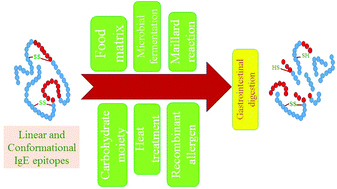Epitope mapping and the effects of various factors on the immunoreactivity of main allergens in egg white
Abstract
Egg white has high protein content and numerous biological/functional properties. However, reported allergenicity for some of the proteins in egg white is an issue that needs to be paid exclusive attention. A consideration of the structure of IgE epitopes and their sequences, as well as a comprehensive understanding of the effects of various processes on epitopes and the impact of the gastrointestinal tract on them, can help target such issues. The current study focuses on the identified IgE epitopes in egg white proteins and evaluation of the effects of the gastrointestinal digestion, carbohydrate moiety, food matrix, microbial fermentation, recombinant allergen, heat treatment, Maillard reaction and combination of various processes and gastrointestinal digestion on egg white allergenicity. Although the gastrointestinal tract reduces the immunoreactivity of native egg white proteins, some of the IgE epitope-containing fragments remain intact during the digestion process. It has been found that the gastrointestinal tract can have both positive and negative impacts on the IgE binding activities of egg white proteins. Elimination of the carbohydrate moiety leads to a reduction in the immunoreactivity of ovalbumin. But, such effects from the carbohydrate parts in the IgE binding activity need to be explored further. In addition, the interaction between the egg white proteins and the food matrix leads to various effects from the gastrointestinal tract on the digestion of egg white proteins and their subsequent immunoreactivity. Further on this matter, studies have shown that both microbial fermentation and Maillard reaction can reduce the IgE binding activities of egg white proteins. Also, as an alternate approach, the thermal process can be used to treat the egg white proteins, which may result in the reduction or increase in their IgE binding activities depending on the conditions used in the process. Overall, based on the reported data, the allergenicity levels of egg white proteins can be mitigated or escalated depending on the conditions applied in the processing of the food products containing egg white. So far, no practical solutions have been reported to eliminate such allergenicity.



 Please wait while we load your content...
Please wait while we load your content...